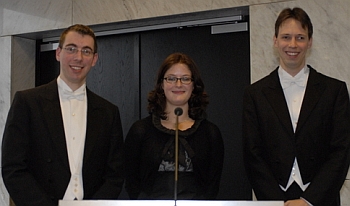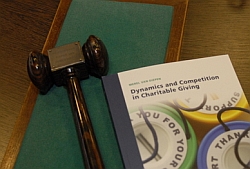Dynamics and Competition in Charitable Giving
 On January 22, Merel van Diepen has defended her PhD thesis entitled “Dynamics and Competition in Charitable Giving”. In her thesis, Merel van Diepen studies the effects of charitable direct mail requests on donations, as the public opinion appears to become more and more dominated by negative aspects. She studies whether society’s current opinions translate to actual donating behavior and provide socially relevant insights to charities to guide their mailing strategies and help increase their revenues.
On January 22, Merel van Diepen has defended her PhD thesis entitled “Dynamics and Competition in Charitable Giving”. In her thesis, Merel van Diepen studies the effects of charitable direct mail requests on donations, as the public opinion appears to become more and more dominated by negative aspects. She studies whether society’s current opinions translate to actual donating behavior and provide socially relevant insights to charities to guide their mailing strategies and help increase their revenues.
One of the results of her research is that charitable requests do cause irritation, but this irritation does not find its way into donating behavior. Thus, charities in the Netherlands have not yet reached the limit and there is still room for more mailings and more funds to raise.
Next, Merel van Diepen finds that direct mailings from a charity are influenced by past direct mailings from the same charity and by direct mailings from competitive charities. These findings are likely to hold for other types of direct mailings as well.
Furthermore she finds that – contrary to the public opinion – charities would have to send even more mailings in order to increase their revenues. The results from all chapters of this dissertation indicate that higher mailing frequencies will increase revenues, even in the long run. An extra mailing will cannibalize on future revenues of the same charity, but the net effect will still be positive, although this only holds for people that already receive many direct mailings and not for all donators. And although competitive mailings may have a negative effect when sent simultaneously, over time they tend to have a complementing effect.
Her Promoter is <link people philip-hans-franses _blank>Prof.dr. Ph.H.B.F. Franses, Professor of Applied Econometrics & Marketing Research, Erasmus School of Economics, Erasmus University. Her Copromotor is <link people bas-donkers _blank>Dr. B. Donkers. Other members of the Doctoral Committee are: Prof.dr.ir. B.J. Bronnenberg, Prof.dr. M.P. Keane and Prof.dr. S. Stremersch.
Merel van Diepen (1981) obtained her master’s degree in econometrics with honors from the Erasmus University Rotterdam in December 2003. In January 2004 she started her PhD research in the fields of marketing and econometrics at the Erasmus Research Institute of Management. Her main research interests are econometric models in marketing and charitable giving. She presented her research at various international conferences and part of her work will be published in the Journal of Marketing Research.
Abstract: 
Nowadays potential donors receive many direct mailings from many different charities, all soliciting their donations. As charities depend for a large part on their revenues from direct mail it is important to uncover the precise effects of charitable direct mailings on donating behavior. Existing studies on donating behavior generally focus on a single decision context, that is, a single donation to a single charitable cause. In reality, however, people receive many donation requests, and the responses to these requests may not be independent.
In this thesis we study the dynamic and competitive effects of charitable direct mailings on donating behavior. We present two direct mailing response models, with the first focusing primarily on the competitive dimension, and the second focusing mainly on the dynamic dimension. To calibrate these models we have access to a unique dataset consisting of the databases of multiple charity organizations, providing us with detailed information on direct mailings and donations at the individual donor’s level. In addition, we conducted a direct mailing field experiment in cooperation with various charities. In the analysis of this experiment, we zoom in on the direct mailing effects on actual behavior and on the underlying motivational process. We establish that substantial dynamic and competitive effects exist and that the single decision context can thus not be justified for properly analyzing direct mailing response behavior. We also provide some practical implications of these results for charities. One of our surprising results is that – contrary to the public opinion – charities would have to send even more mailings in order to increase their revenues.
More Information
Pictures of the Defense
Full Text of the Dissertation


